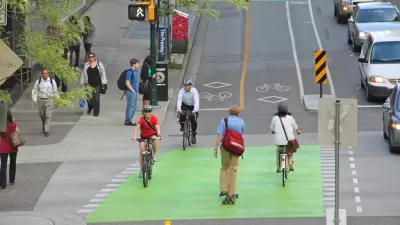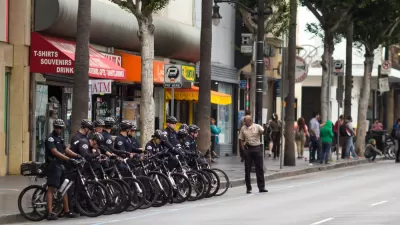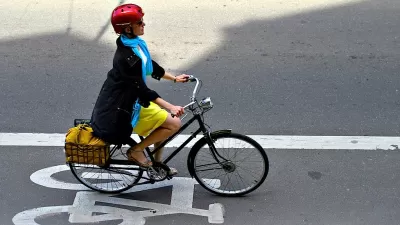You get what you pay for, goes the old saying, and a new study out of New Zealand makes the case that when it comes investing in bike infrastructure, it's best to invest in quality.

For every dollar spent to build new separated bike lanes, cities could save as much as $24 thanks to lower health care costs and less pollution and traffic, according to a new study from researchers in New Zealand," according to Adele Peters.
However, small investments in bike infrastructure can actually be a setback for biking's mode share. According to Peters, "[in] cities dominated by cars, a small increase in cycling tends to lead to more biking injuries and deaths, making other people more afraid to ride. The way to overcome that problem, the researchers found, is to make a bigger commitment to better bike lanes."
Peters briefly describes the ground this study breaks as it joins a growing body of research about the many benefits of bike infrastructure: "this study may be the first to look at how different types of bike infrastructure investments pay cities back later."
FULL STORY: The Cities That Spend The Most On Bike Lanes Later Reap The Most Reward

Trump Administration Could Effectively End Housing Voucher Program
Federal officials are eyeing major cuts to the Section 8 program that helps millions of low-income households pay rent.

Planetizen Federal Action Tracker
A weekly monitor of how Trump’s orders and actions are impacting planners and planning in America.

Ken Jennings Launches Transit Web Series
The Jeopardy champ wants you to ride public transit.

Driving Equity and Clean Air: California Invests in Greener School Transportation
California has awarded $500 million to fund 1,000 zero-emission school buses and chargers for educational agencies as part of its effort to reduce pollution, improve student health, and accelerate the transition to clean transportation.

Congress Moves to End Reconnecting Communities and Related Grants
The House Transportation and Infrastructure Committee moved to rescind funding for the Neighborhood Equity and Access program, which funds highway removals, freeway caps, transit projects, pedestrian infrastructure, and more.

From Throughway to Public Space: Taking Back the American Street
How the Covid-19 pandemic taught us new ways to reclaim city streets from cars.
Urban Design for Planners 1: Software Tools
This six-course series explores essential urban design concepts using open source software and equips planners with the tools they need to participate fully in the urban design process.
Planning for Universal Design
Learn the tools for implementing Universal Design in planning regulations.
Heyer Gruel & Associates PA
Ada County Highway District
Institute for Housing and Urban Development Studies (IHS)
City of Grandview
Harvard GSD Executive Education
Toledo-Lucas County Plan Commissions
Salt Lake City
NYU Wagner Graduate School of Public Service




























